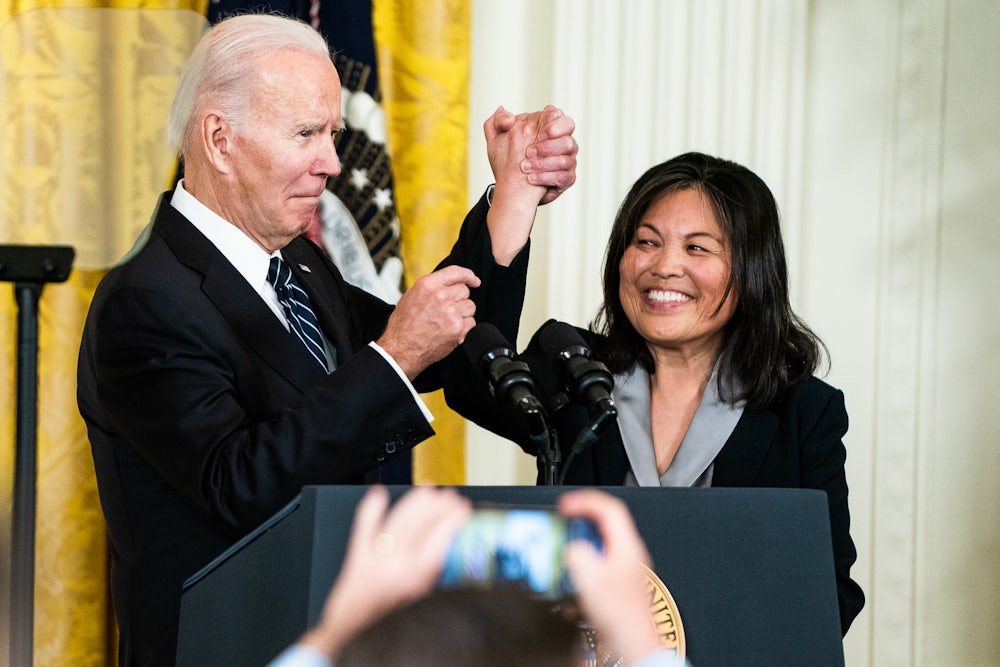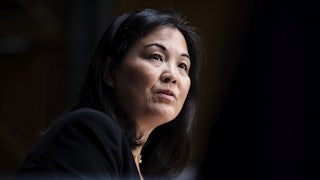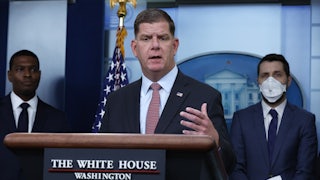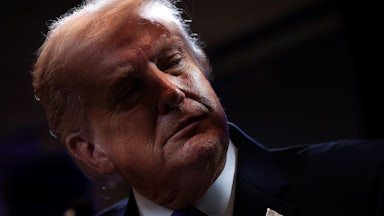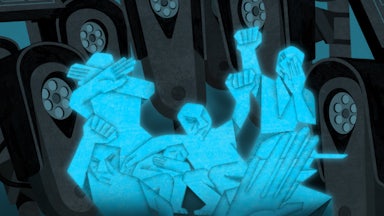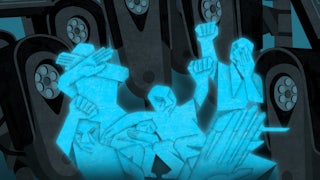A central paradox of contemporary politics is that class resentment is its lingua franca yet policies to help working people are a hard sell. Republicans oppose these policies. Democrats favor them, but inconsistently.
The latest iteration of this maddening reality is the imperiled nomination of Julie Su for labor secretary. Su, who is currently the deputy and acting secretary, is appearing Thursday morning at 10 a.m. before the Senate Committee on Health, Education, Labor and Pensions, or HELP, which is chaired by Vermont Senator Bernie Sanders. You can watch the proceedings live here.
Su is a superb nominee, with extensive experience in labor law long predating her time in the Biden administration. “She has devoted her life,” wrote a group of 94 nonprofits in an April 18 letter to Sanders, “to fighting for workers’ rights, holding exploitative employers accountable, leveling the playing field for high-road employers, and doing pioneering work to protect the most vulnerable of workers.” Su spent seven years as California’s labor commissioner, and, as early as 1995, fresh out of Harvard Law School, she successfully represented undocumented Thai garment workers putting in 18-hour days at a Southern California sweatshop. That won her a MacArthur “genius” grant.
“You have a genuine expert,” Seth Harris, deputy labor secretary under President Barack Obama, told me. “That is one of the reasons why Republicans oppose her.” It’s also why four conservative Democrats—Senators Joe Manchin of West Virginia, Kyrsten Sinema of Arizona, Mark Kelly of Arizona, and Jon Tester of Montana—may also oppose her, along with independent Senator Angus King of Maine, who caucuses with the Democrats. The votes that Su is most in peril of losing are—who else?—Manchin, who reportedly grumbled about the nomination to the White House, and Sinema. But with all Republicans expected to vote “no” and California Senator Dianne Feinstein’s return uncertain, Su can’t afford to lose more than one non-Republican.
Su has two vulnerabilities, both of which came up in her nomination hearing for deputy secretary two years ago.
The first is that at the start of the Covid epidemic, California’s Employment Development Department, which she oversaw, “was unable to automatically process nearly half of the claims submitted online between March and September 2020,” according to an auditor’s report. To ease the bottleneck, the agency stopped reviewing eligibility for most claims. That resulted in the payout of an estimated $20 billion to people who weren’t eligible, many of them identity thieves. The problem of fraud was hardly unique to California; nationally, at least $163 billion in unemployment benefits went out to ineligible applicants. Since becoming deputy labor secretary, Su has helped oversee fledgling efforts to help states root out such fraud.
Su’s second vulnerability concerns her championing California’s Assembly Bill 5, a tough 2019 law that cracked down on the misclassification of employees as independent contractors. The legislation imposed what’s called an “ABC test” to determine whether someone can legitimately be excluded from employment benefits. A was that the worker is “free from the control and direction of the hiring entity in connection with the performance of the work.” B was that the worker “performs work that is outside the usual course of the hiring entity’s business.” C was that the worker is “engaged in an independently established trade, occupation, or business.” If a business wanted to classify someone as an independent contractor, A, B, and C all had to be true. If they weren’t, the worker went on the payroll.
“Ms. Su was integral in the formation and implementation of AB5,” says a March 30 letter to Sanders from a coalition of 32 business groups. This is a vulnerability only in the sense that Uber, Lyft, and other app-based companies hated it and, in 2020, successfully pushed through Proposition 22, a voter initiative reversing A.B. 5. A California Superior Court invalidated Prop 22; an appeals court mostly reinstated it; and the matter is now likely headed to California’s Supreme Court.
The national business community is fervently opposed to anything like A.B. 5 being passed by Congress because it wants to maintain its current unconscionable latitude in deciding whether any given worker will receive minimum wage, Social Security, and other protections that employers are required to furnish employees.
After the unemployment insurance fiasco and the A.B. 5 controversy received a full airing two years ago, Su was confirmed for deputy secretary, 50–47. Manchin, Sinema, Tester, Kelly, and King all voted for her.
But the following year, David Weil’s nomination for wage and hour administrator at the Labor Department failed, 47–53, with Manchin, Sinema, and Kelly all voting against him. Weil is relevant because, as I noted at the time, a principal objection to his nomination was that he planned to apply the ABC test at the federal level, which wasn’t true. Unlike Weil, Su played an actual role in the passage of A.B. 5. But Su is no more likely than Weil to apply the ABC test at the federal level, as was made clear in October when the Labor Department issued a proposed regulation concerning independent contractors. The proposal’s text stated explicitly that the Labor Department lacked legal authority to implement the ABC test because that would be “inconsistent with Supreme Court precedent.” The ABC test could be imposed, the department said, only if the Supreme Court reversed its precedent (not likely anytime soon) or if Congress passed a new law (more likely, but not by much).
That proposed regulation’s disavowal of the ABC test didn’t stop 11 Republicans, including House Speaker Kevin McCarthy, from suggesting in an April 6 letter of their own to Sanders that Su was plotting to insert it into the final version of the rule. “They’re just making stuff to try to throw against the wall,” Judy Conti, government affairs director of the nonprofit National Employment Law Project, told me. A gaggle of business groups has even put up a Stand Against Su website to trash her.
Su is expected to make a strong pitch for herself in Thursday’s HELP hearing. She’s smart, dedicated, and knows much more about labor law than any of the committee members, including Sanders. She’s got a lot of experience fielding hostile questions about unemployment insurance fraud and A.B. 5. Her supporters are hoping her performance will win over the wavering Democrats and King.
Cecil E. Roberts, president of the United Mine Workers, endorsed Su on April 14, putting pressure on Manchin to drop his objections. Kelly isn’t up for reelection, as he was when he voted against Weil. Tester is up for reelection, which may perhaps turn him against Su. Otherwise he has no great reason to oppose her. Nor does King.
The big question mark is Sinema. Su can lose Manchin, or she can lose Sinema, but if she loses both she won’t have enough votes. If Manchin’s already a “no,” then it’s probably up to Sinema. We’ve been here before, leaving a major decision hostage to Sinema’s ever more illiberal impulses, and it isn’t pleasant. My guess is the Democrats are about to fail the working class yet again. I hope to God I’m wrong.
